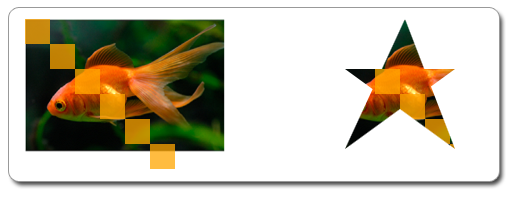ジオメトリック マスクにクリップする方法
このトピックでは、ジオメトリック マスクを使用してレイヤーの領域をクリップする方法について説明します。
ジオメトリック マスクを使用して領域をクリップするには
- リージョンのクリップに使用する ID2D1Geometry を作成します。
- ID2D1RenderTarget::CreateLayer を呼び出してレイヤーを作成します。
- ID2D1RenderTarget::P ushLayer を呼び出し、手順 1 で定義したジオメトリック マスクを渡します。
- クリップするコンテンツを描画します。
- ID2D1RenderTarget::P opLayer を呼び出して、レンダー ターゲットからレイヤーを削除します。
次の例では、ジオメトリック マスクを使用して画像と複数の四角形をクリップします。 次の図は、左側の元のビットマップと、右側のジオメトリック マスクにクリップされたビットマップを示しています。

前の図に示すように図面をクリップするには、ID2D1PathGeometry を作成し、それを使用してstarを定義します。 この方法を次のコードに示します。
// Create the path geometry.
if (SUCCEEDED(hr))
{
hr = m_pD2DFactory->CreatePathGeometry(&m_pPathGeometry);
}
// Write to the path geometry using the geometry sink to create a star.
if (SUCCEEDED(hr))
{
hr = m_pPathGeometry->Open(&pSink);
}
if (SUCCEEDED(hr))
{
pSink->SetFillMode(D2D1_FILL_MODE_WINDING);
pSink->BeginFigure(D2D1::Point2F(20, 50), D2D1_FIGURE_BEGIN_FILLED);
pSink->AddLine(D2D1::Point2F(130, 50));
pSink->AddLine(D2D1::Point2F(20, 130));
pSink->AddLine(D2D1::Point2F(80, 0));
pSink->AddLine(D2D1::Point2F(130, 130));
pSink->EndFigure(D2D1_FIGURE_END_CLOSED);
hr = pSink->Close();
}
SafeRelease(&pSink);
CreateLayer を呼び出してレイヤーを作成します。
注意
Windows 8以降、CreateLayer を呼び出す必要はありません。 ほとんどの場合、このメソッドを呼び出さないとパフォーマンスが向上し、Direct2D によってレイヤー リソースが管理されます。
ジオメトリ マスクを使用して PushLayer を呼び出して、レイヤーをプッシュします。 クリップするコンテンツを描画し、 PopLayer を呼び出してレイヤーをポップします。 これにより、star形状の描画が生成されます。 この方法を次のコードに示します。
HRESULT DemoApp::RenderWithLayer(ID2D1RenderTarget *pRT)
{
HRESULT hr = S_OK;
// Create a layer.
ID2D1Layer *pLayer = NULL;
hr = pRT->CreateLayer(NULL, &pLayer);
if (SUCCEEDED(hr))
{
pRT->SetTransform(D2D1::Matrix3x2F::Translation(350, 50));
// Push the layer with the geometric mask.
pRT->PushLayer(
D2D1::LayerParameters(D2D1::InfiniteRect(), m_pPathGeometry),
pLayer
);
pRT->DrawBitmap(m_pOrigBitmap, D2D1::RectF(0, 0, 200, 133));
pRT->FillRectangle(D2D1::RectF(0.f, 0.f, 25.f, 25.f), m_pSolidColorBrush);
pRT->FillRectangle(D2D1::RectF(25.f, 25.f, 50.f, 50.f), m_pSolidColorBrush);
pRT->FillRectangle(D2D1::RectF(50.f, 50.f, 75.f, 75.f), m_pSolidColorBrush);
pRT->FillRectangle(D2D1::RectF(75.f, 75.f, 100.f, 100.f), m_pSolidColorBrush);
pRT->FillRectangle(D2D1::RectF(100.f, 100.f, 125.f, 125.f), m_pSolidColorBrush);
pRT->FillRectangle(D2D1::RectF(125.f, 125.f, 150.f, 150.f), m_pSolidColorBrush);
pRT->PopLayer();
}
SafeRelease(&pLayer);
return hr;
}
関連トピック